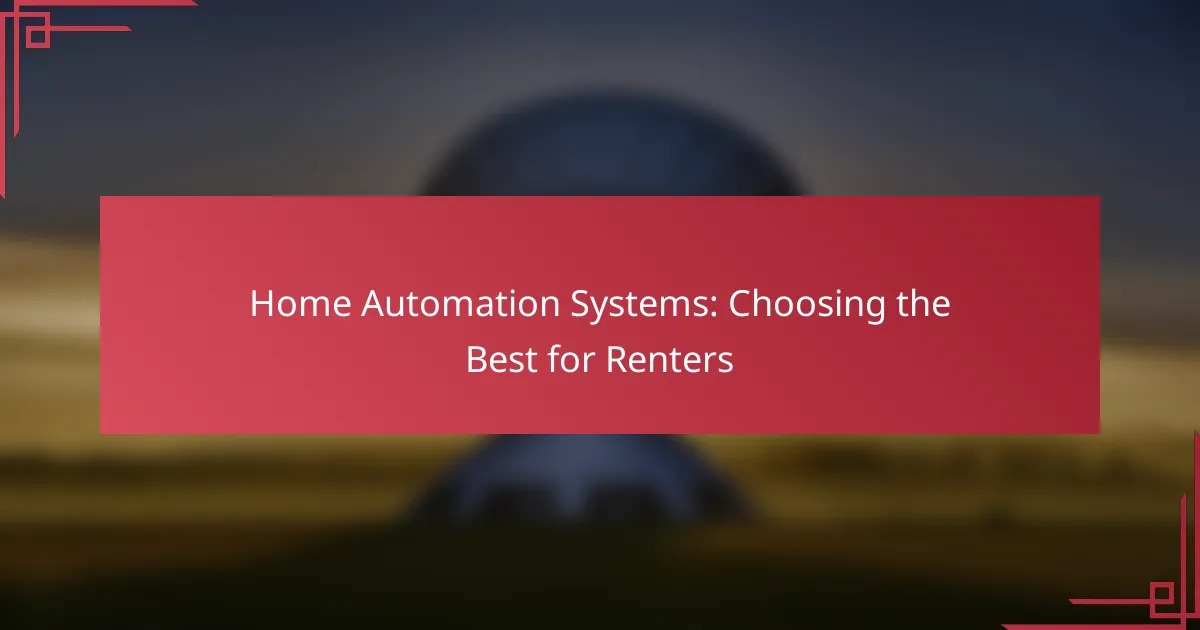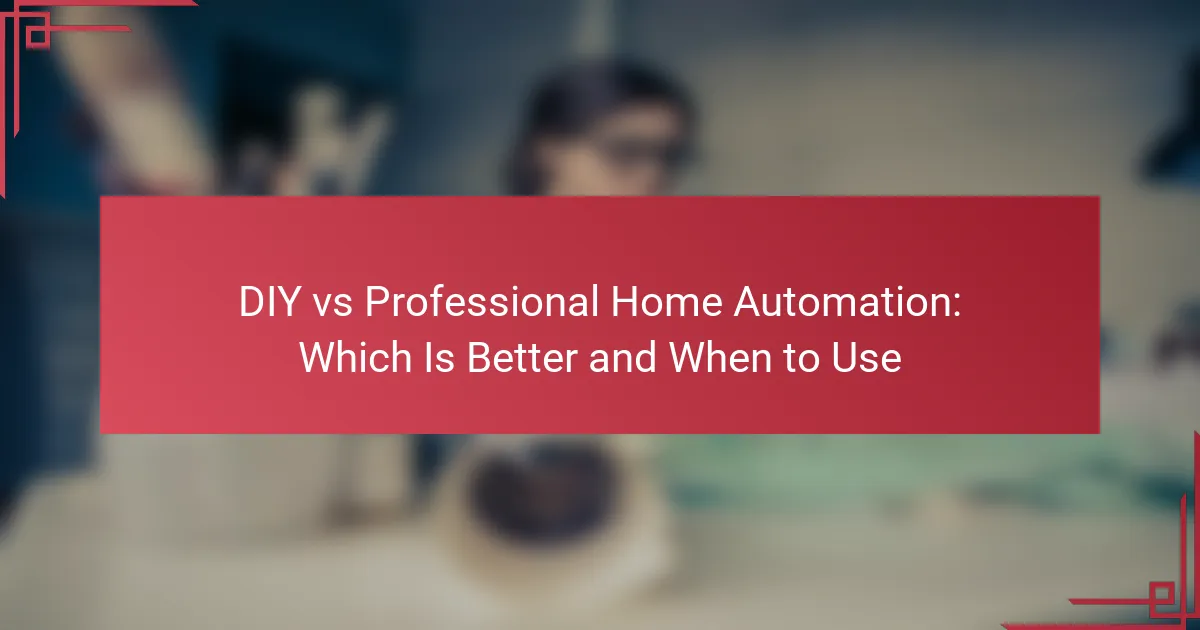As home automation continues to evolve, choosing the right brand is crucial for ensuring long-term value. Brands like Philips Hue, Google Nest, and Amazon Echo are recognized for their reliability, compatibility, and customer support, making them strong contenders in the market. By evaluating factors such as brand reputation, product durability, and software updates, consumers can make informed decisions that enhance their smart home experience.

Which home automation brands offer the best long-term value in Ireland?
In Ireland, the best long-term value in home automation brands typically comes from those that offer reliable performance, extensive compatibility, and strong customer support. Brands like Philips Hue, Google Nest, Amazon Echo, Samsung SmartThings, and Apple HomeKit stand out for their durability and integration capabilities.
Philips Hue
Philips Hue is renowned for its smart lighting solutions that provide both versatility and energy efficiency. Users can easily control their lights remotely via a smartphone app or voice commands, making it convenient for daily use.
Consider investing in a starter kit, which usually includes a hub and several bulbs, to get the most value. Philips Hue bulbs are compatible with various smart home systems, enhancing their long-term usability.
Google Nest
Google Nest offers a range of smart devices, including thermostats, cameras, and speakers, all designed to work seamlessly together. The Google Home app allows for easy management of devices, providing a unified experience.
When choosing Google Nest products, consider the compatibility with other smart home devices. Their integration with Google Assistant makes voice control straightforward, enhancing user convenience.
Amazon Echo
Amazon Echo devices serve as smart speakers and hubs for controlling various smart home products. With Alexa as the voice assistant, users can manage tasks, play music, and control compatible devices hands-free.
To maximize long-term value, look for Echo devices that support Zigbee or Bluetooth, allowing for broader compatibility with other smart home products. Regular software updates ensure continued functionality and security.
Samsung SmartThings
Samsung SmartThings is a comprehensive platform that connects various smart devices, allowing users to automate their homes effectively. It supports a wide range of products from different manufacturers, making it a versatile choice.
Investing in a SmartThings hub can enhance your home automation experience by enabling seamless integration and control. Be mindful of device compatibility to ensure a smooth setup and operation.
Apple HomeKit
Apple HomeKit provides a secure and user-friendly platform for managing smart home devices through iOS devices. It emphasizes privacy and security, making it a preferred choice for Apple users.
To get the best long-term value from HomeKit, choose devices that are labeled as “Works with Apple HomeKit.” This ensures compatibility and allows for easy control through Siri or the Home app on your iPhone or iPad.

How do I assess the long-term value of home automation brands?
To assess the long-term value of home automation brands, consider factors like brand reputation, product durability, customer support, and software updates. Evaluating these aspects helps ensure that your investment remains beneficial over time.
Brand reputation
Brand reputation is crucial when evaluating home automation brands. Look for companies with a strong track record of reliability and positive customer feedback. Research online reviews and ratings to gauge how well a brand is perceived in the market.
Consider brands that have been in the industry for several years, as longevity often indicates trustworthiness. Brands that are well-known for their innovation and quality typically offer better long-term value.
Product durability
Product durability refers to how well home automation devices withstand wear and tear over time. Look for brands that use high-quality materials and have undergone rigorous testing to ensure longevity. Devices that are built to last can save you money on replacements and repairs.
Check for warranties and guarantees, as these can be indicators of a brand’s confidence in their products. A warranty of several years is often a good sign that the manufacturer expects their devices to perform well over time.
Customer support
Effective customer support is essential for resolving issues that may arise with home automation systems. Brands that offer comprehensive support, including phone, chat, and email options, tend to provide better long-term value. Quick response times and knowledgeable representatives can significantly enhance your experience.
Look for brands that have a reputation for excellent customer service, as this can be a deciding factor when you need assistance. User forums and community support can also be valuable resources for troubleshooting and advice.
Software updates
Software updates are vital for maintaining the functionality and security of home automation devices. Brands that regularly release updates demonstrate a commitment to improving their products and addressing vulnerabilities. Ensure that the brand you choose has a clear policy on software updates.
Check for compatibility with new technologies and features, as this can extend the useful life of your devices. Brands that provide long-term support for their software can enhance the overall value of your home automation investment.

What features should I consider when choosing a home automation brand?
When selecting a home automation brand, consider compatibility with devices, ease of use, security features, and integration with smart assistants. These factors will significantly impact the functionality and convenience of your smart home system.
Compatibility with devices
Compatibility with devices is crucial for a seamless home automation experience. Ensure the brand supports a wide range of devices, including smart lights, thermostats, cameras, and locks. Look for systems that work with popular protocols like Zigbee, Z-Wave, or Wi-Fi to maximize your options.
Check if the brand offers a list of compatible devices on their website. This can help you avoid investing in products that may not work together, leading to frustration and additional costs.
Ease of use
Ease of use is essential for both setup and daily operation of your home automation system. A user-friendly interface, whether through a mobile app or web portal, can make managing your devices straightforward. Look for brands that offer intuitive controls and clear instructions.
Consider how easily you can add new devices or create automation routines. Brands that allow for simple drag-and-drop functionality or pre-set automation templates can save you time and effort.
Security features
Security features should be a top priority when choosing a home automation brand. Look for systems that offer end-to-end encryption, regular software updates, and two-factor authentication to protect your data and devices. Brands that adhere to industry standards, such as those set by the Internet of Things Security Foundation, are often more reliable.
Additionally, consider brands that provide alerts for unusual activity or unauthorized access attempts. This proactive approach can help you maintain a secure smart home environment.
Integration with smart assistants
Integration with smart assistants like Amazon Alexa, Google Assistant, or Apple HomeKit enhances the functionality of your home automation system. Brands that support these platforms allow you to control devices using voice commands, making your home more convenient and accessible.
Check the level of integration offered; some brands may provide deeper functionality, such as the ability to create complex routines or control multiple devices simultaneously. This can significantly enhance your overall smart home experience.

What are the pricing ranges for popular home automation brands?
Home automation brands vary significantly in pricing, typically ranging from affordable options to premium systems. Understanding these price ranges can help consumers make informed decisions based on their budget and desired features.
Philips Hue pricing
Philips Hue smart lighting products generally start around $15 for basic bulbs and can go up to $200 or more for advanced kits that include multiple lights and a hub. The cost varies based on the type of bulb, such as standard, color, or specialty lights.
When considering Philips Hue, it’s essential to factor in the potential need for a hub, which can add to the initial investment. Additionally, purchasing bundles often provides better value than buying individual items.
Google Nest pricing
Google Nest products, including smart speakers, displays, and thermostats, typically range from about $50 to $250. For instance, the Nest Mini starts around $50, while the Nest Learning Thermostat can cost up to $250, depending on features and functionalities.
When evaluating Google Nest pricing, consider the ecosystem you are building. Investing in multiple Google Nest devices can enhance compatibility and functionality, potentially justifying higher upfront costs for long-term savings on energy bills and convenience.



